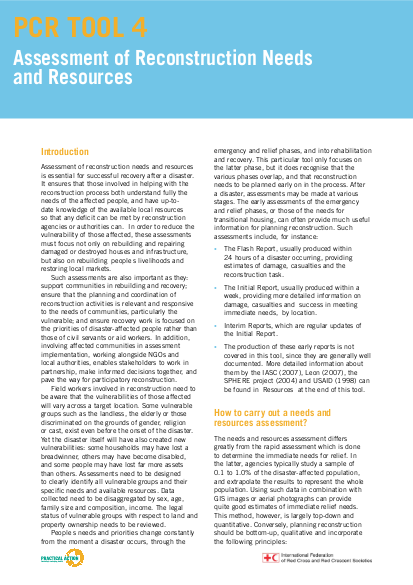
Assessment of reconstruction needs and resources is essential for successful recovery after a disaster. It ensures that those involved in helping with the reconstruction process both understand fully the needs of the affected people, and have up-todate knowledge of the available local resources so that any deficit can be met by reconstruction agencies or authorities can. In order to reduce the vulnerability of those affected, these assessments must focus not only on rebuilding and repairing damaged or destroyed houses and infrastructure, but also on rebuilding people’s livelihoods and restoring local markets. Such assessments are also important as they: support communities in rebuilding and recovery; ensure that the planning and coordination of reconstruction activities is relevant and responsive to the needs of communities, particularly the vulnerable; and ensure recovery work is focused on the priorities of disaster-affected people rather than those of civil servants or aid workers. In addition, involving affected communities in assessment implementation, working alongside NGOs and local authorities, enables stakeholders to work in partnership, make informed decisions together, and pave the way for participatory reconstruction.
Resource collections
- Accountability to affected populations (AAP)
- ALNAP focus topics
- Evaluating humanitarian action
- Monitoring and Evaluation (M&E)
- Monitoring of humanitarian action
- UN Habitat - Urban Response Collection
- Urban Response - Urban Crisis Preparedness and Risk Reduction
- Urban Response Collection - Community Engagement and Social Cohesion
- Urban Response Collection - Economic Recovery
- Urban Response Collection - Environment and Climate Change
- Urban Response Collection - Housing, Land and Property
- Urban Response Collection - Urban Crisis Response, Recovery and Reconstruction
- Urban Response Collection - Urban Resilience
- Use of evaluation evidence